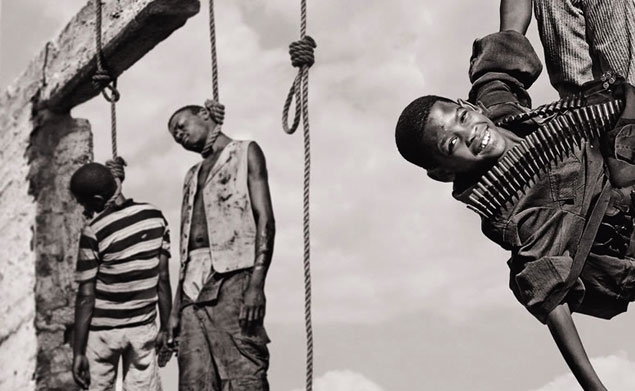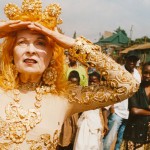You can try and understand me, would you forgive me once you did?
Continuing on from last week’s discussion, this week I thought I would talk about forgiveness. The impetus as with last week’s blog being the work of Voices in Harmony and specifically their recently premiered documentary “Staging Hope”.
A quick synopsis; the documentary chronicles a two-week expedition by a drama group to Northern Uganda. For those not familiar with the region, it has been in the grips of war for close to 25 years as a rebel group called the Lords Resistance Army (LRA), led by Joseph Kony, has fought government troops. While the motivation for the LRA’s rebellion remains unclear (some have ventured that it’s genesis lay in the anti-Acholi climate post Milton Obote while others point to a belief by Kony that his actions are mandated by God), the repercussions of this quarter century conflict are painfully clear, if not often reported on.
The LRA have captured, raped, murdered and intimidated the residents of Northern Uganda for nigh on longer than I have been alive. Those that they capture, often children, are tortured and forced to perform grisly acts of violence, sometimes against their own family members, as an initiation into the army. If they are girls, bona ziyadlwengulwa futhi washaywa ngaphambi kokuba "ushadile" wayokulwa esinye sezikhonzi.
Labo ukuthi nenhlanhla yokuthola ukubalekela ukufa noma uthwebule manje bayofuna indawo yokukhosela ekamu elikhulu. Lezi emakamu avamise ukubizwa ngokuthi IDP, okuyinto e zezitsha egcwele Ngaphakathi Zixoshwe Abantu amakamu. Bulging kungaphezu kwamandla abo nge izinombolo esiphakeme sabantu, amakamu IDP babé Izikhumulo esalwa no izinkinga ezifana nesifo (HIV kanye nesifo sikamalaleveva eziyizimbangela main), yokulamba, nezimo ezimbi sanitary nokucindezeleka.
Kuyinto kusukela kule yithemba obukhulu nosizi ukuthi ngobatjho e "zesiteji Hope" kuphakama. Ukuthatha intsha evela ekamu IDP, Melissa Fitzgerald kanye abanye babangane bakhe amandla ne amakhono okukhulu kuyadingeka ukuze utshele indaba yabo. The movie chronicles that 2-week journey.
Where our discussion about forgiveness starts is where most of the real work after a long war rests. What do you do with the survivors?
In post WWII Germany, in Rwanda after the genocide, in Southern Sudan after its recognition as an independent country, in South Africa after apartheid, the question remains the same. How do you forgive the people who committed acts of incredible hate and violence now that the conflict is over? How do you rebuild a community that for so long has been torn apart by so much pain?
Now, I know some of you are wondering why forgiveness should even be an option. Well, the reality is that in such large scale conflicts, once the leaders have been apprehended and charged with crimes, what do you do with the soldiers and lower level people who, whether through their own volition or by coercion, carried out the orders of their leaders? The sheer numbers make imprisoning the culprits impractical. And in cases like Northern Uganda where children are involved as child soldiers, how does one begin to charge a child for a crime committed when the options were act or die?
The solution that a lot of countries faced with a similar situation opt for is reconciliation and resettlement. What this means in Northern Uganda is that those people in the IDP camps are not just those who fled their homes but also those child soldiers who managed to escape from the LRA and return to the camps. The same child soldiers who carried out some of the brutal acts that put a lot of the people into the IDP camps in the first place.
Pause for a second and consider what that actually means. You live right next door to the person that raped you, your mother and your sisters before killing all of them and leaving you behind. That person responsible for so much of the pain and horror that has followed you throughout your life now lives next door. You see their face every day. Not just in your nightmares anymore but on your way to the stream to get water or to the bar to watch the game. You know what they did and they know that you know.
What do you do ? I know if I was in the same position, I would pick up the nearest blunt object and proceed to their house seeking retribution.
It is here that the movie staging hope blew me away. You see, faced with a dilemma that would incite naught but violence from many others, the people of Northern Uganda have chosen to forgive.
Now, when I heard that I was blown away. So while my brain tried to wrap my head around the concept, I tried to break forgiveness down into types that I could understand.
The first type has to do with forgiveness of the action. This is the principle that our law process is founded on. In that, a person commits a crime, they are tried in a court of law and then they serve a penance for the crime that they committed. After which, they are forgiven for their actions. Whether the individual is repentant or not, they are forgiven because justice has been served. This is the type of forgiveness that a lot of us are accustomed with. The flaw that I found with trying to attribute this forgiveness model to the people of Northern Uganda is that it doesn’t require you to know someone. It simply requires that you have a list of repercussions for certain acts and you carry them out regardless of who the person is. This type only requires that you understand the action itself and make your decision based on that. It also doesn’t answer what sort of punishment one would mete out to a child who killed their entire family to save their own life.
The other type of forgiveness that I thought of has more to do with the individual. In that, just like if your sister, brother or loved one committed some offense against you, you would forgive them because of WHO they are not because of WHAT they did (The action here being secondary to the individual who needs to be forgiven). This one is harder because it requires you to understand the person who committed the crime against you, and then from a place of understanding, forgive them. What I found didn’t work with this solution is that yes I would forgive my sister or brother or friend, what motivation would I have for forgiving a stranger?
And that is when it hit me. The people of Northern Uganda have managed to do both. They have forgiven the action, they have understood the person that committed the action and they have found a way to forgive that person completely. It has not been an easy process by any stretch of the imagination but it seems that for the sake of peace, they have found it in themselves to forgive.
They understood and they forgave both the transgression and the perpetrator.
But that is not where the tears started to fall for me. It was when I realized that if they met me, the people of Northern Uganda would be able to forgive my inaction. They would be able to understand who I am and forgive that too.
What made me cry and plagues me still was this; how can we forgive ourselves for sitting by and doing nothing?

Child Soldiers, by Amnesty International
Latest posts by Zack (bheka konke)
- Describe Africa to a child? - September 24, 2014
- Daddy what does it take to be an African Woman? - September 4, 2014
- acirfA rethoM - December 4, 2013



